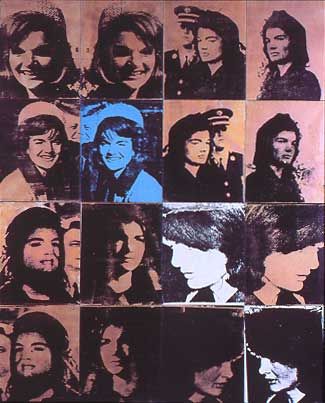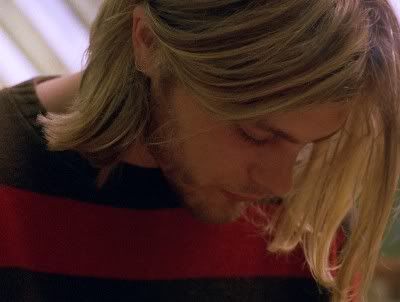8.29.2005
gus van sant's last days (by way of andy warhol)
andy warhol was always saying things like: "if you look at a thing long enough, it loses all of its meaning." he documented a dissolving empathy-- his paper-thin jackie-o returns to the tabloid from which it was pulled. she is a document of a cultural event, and little more. "meaning" follows the logic of the above quote-- warhol repeats images, standardizes them, pulls things to the surface, and so forth. gone are the brooding conceits of wannabe picassos, leaving something slick and lifeless and homogeneous in their place.
and, for all of that, i love it:

what's most alluring about warhol comes after this stereotypical equation (image-repetition-entropy). his best work produces a remainder. stripped of all entryways of an "inner experience," the warhol portrait still bears a certain sting. if the final gaze is one of detached formalism, a strong wind marks the spectatorial distance enabling it. the "sting" of a warhol looks neither backwards nor forwards. it does not lament humanizing connections, nor does it foresee a beautiful future. it is a raw space of dumb gawking. a "duh" space; a blank stare. a strange conflation of glamour, repetition and death mobilizes it-- but it refuses to make such sophistications manifest. a painted warhol head will never grow a brain. it is "deeply superficial," like the man who brought it to life.

gus van sant's film last days speaks a similar language.
it finds its tabloid routes in the death of kurt cobain, with the usually insufferable michael pitt as its "superstar." but beyond that, it dismantles most of its movie-ness. it is the cinematic shell of a well-hyped tragedy, leaving all attempted profundity behind. the suicide at its center is inevitable and elusive. it finally occurs off-screen. there are several half-hearted attempts to generate meaning throughout the film, but each seem to erode explanation further. dialogue embodies the uselessness of speaking.
pitt (cobain) centralizes the film. he is a kind of negative space-- his affective corelessness points to his parameters. van sant avoids close-ups for the most part. pitt becomes an indexical figure, leading to several landscapes. we look at the handsome, woodland decay of his northwest estate. we watch the attractive, vacuous hangers-on who never seem to let him be. and we watch pitt himself-- with his golden hair and seductive, wounded physique. his body is both a tabloid surface and a self-perpetuating desire machine.
which possibly brings me to one of the film's strangest elements. last days doesn't simply invite one to look, it invites one to continue to look. the film finds its starting point in warholian entropy. we've seen this story before, we're tired of it, etc. and with no ideology to offer, the film moves forward regardless. even the camera work has a keen blankness to it. the showy lyricism of elephant (which i posted about here) is gone, and all traces of commentary fade with it. a deadly, compulsive movement sets in. last days is a forward march; a literal "death drive."
van sant's eroticism is raw and self-sustaining. stripped of its usual veils, it emerges in all its hypnotic boredom. it refers to no morality. when pitt's strange ascension to heaven becomes an opportunity to check out his ass, there is no necrophilia. democratic eroticism-- no gaze is better or worse than the one that came before it. an even, permanent appetite floating toward death. a spooky experience that left me feeling both brainless and meaningful.
and, for all of that, i love it:

what's most alluring about warhol comes after this stereotypical equation (image-repetition-entropy). his best work produces a remainder. stripped of all entryways of an "inner experience," the warhol portrait still bears a certain sting. if the final gaze is one of detached formalism, a strong wind marks the spectatorial distance enabling it. the "sting" of a warhol looks neither backwards nor forwards. it does not lament humanizing connections, nor does it foresee a beautiful future. it is a raw space of dumb gawking. a "duh" space; a blank stare. a strange conflation of glamour, repetition and death mobilizes it-- but it refuses to make such sophistications manifest. a painted warhol head will never grow a brain. it is "deeply superficial," like the man who brought it to life.

gus van sant's film last days speaks a similar language.
it finds its tabloid routes in the death of kurt cobain, with the usually insufferable michael pitt as its "superstar." but beyond that, it dismantles most of its movie-ness. it is the cinematic shell of a well-hyped tragedy, leaving all attempted profundity behind. the suicide at its center is inevitable and elusive. it finally occurs off-screen. there are several half-hearted attempts to generate meaning throughout the film, but each seem to erode explanation further. dialogue embodies the uselessness of speaking.
pitt (cobain) centralizes the film. he is a kind of negative space-- his affective corelessness points to his parameters. van sant avoids close-ups for the most part. pitt becomes an indexical figure, leading to several landscapes. we look at the handsome, woodland decay of his northwest estate. we watch the attractive, vacuous hangers-on who never seem to let him be. and we watch pitt himself-- with his golden hair and seductive, wounded physique. his body is both a tabloid surface and a self-perpetuating desire machine.
which possibly brings me to one of the film's strangest elements. last days doesn't simply invite one to look, it invites one to continue to look. the film finds its starting point in warholian entropy. we've seen this story before, we're tired of it, etc. and with no ideology to offer, the film moves forward regardless. even the camera work has a keen blankness to it. the showy lyricism of elephant (which i posted about here) is gone, and all traces of commentary fade with it. a deadly, compulsive movement sets in. last days is a forward march; a literal "death drive."
van sant's eroticism is raw and self-sustaining. stripped of its usual veils, it emerges in all its hypnotic boredom. it refers to no morality. when pitt's strange ascension to heaven becomes an opportunity to check out his ass, there is no necrophilia. democratic eroticism-- no gaze is better or worse than the one that came before it. an even, permanent appetite floating toward death. a spooky experience that left me feeling both brainless and meaningful.
